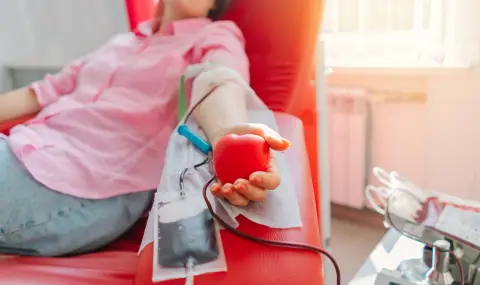Blood supplies are low worldwide. According to the World Health Organization (WHO), blood donation services in many countries face the challenge of providing a sufficient quantity of blood while ensuring its quality and safety.
40% of the world's total of 118.5 million blood donors annually are from high-income countries where only 16% of the world's population lives. However, there is still a constant need for blood donations in these countries. Often, even pay and attractive gifts cannot convince enough people to donate blood. In Germany alone, around 15,000 blood banks are needed per day.
What is donated blood tested for?
Anyone who wants to donate blood must be healthy. The goal is to protect both the donor and the recipient. In order to exclude possible infection, the hemoglobin level and the temperature of the donor are measured - by a small prick of the finger or the ear.
Blood is tested for a variety of antibodies that protect against viruses: infections such as hepatitis, HIV, syphilis or parvovirus B19 must be ruled out. Finally, doctors check the donor's data set in his blood donation registration, measure his pulse and blood pressure. If everything is normal, blood donation can be done.
How can donating blood be facilitated?
Not in all cases the above-described examination must necessarily be performed by doctors. From 2023, their presence is not absolutely necessary when donating blood in Germany. According to the changes in the Blood Transfusion Act, the use of telemedicine procedures is now also permissible. They should help ensure the blood supply in regions with a shortage of specialists, as well as extend the working hours of blood donation centers.
In telemedicine blood donation, trained non-medical personnel perform the blood donation, check the data, test the blood and can provide first aid in emergencies. The doctor is connected via video link only. Telemedicine blood donation is not intended for first-time donors, but primarily for people who donate blood regularly. This practice also faces criticism - for example, that doctors are unable to make a completely correct assessment of the donor's condition.
Can artificial blood solve all problems?
Artificial blood could also help solve the problem of the shortage of donated blood - especially for patients with rare blood types or specific incompatibilities. There are over 30 different blood group systems in total. The AB0 blood group system and the Rhesus factor are crucial for blood transfusion.
Only blood type 0- can be used universally, but donors with this blood type are very rare. In April 2024, researchers from Denmark and Sweden were able to convert blood of groups A and B into blood of group 0. This is possible thanks to the use of enzymes from intestinal bacteria. A study conducted in 2019 has already shown that such a transformation is possible thanks to enzymes.
Successful transfusion of red blood cells
The production of platelets and especially of red blood cells (erythrocytes) is very complex, as these cells without a nucleus must develop from special precursor cells in the bone marrow. Newer approaches are aimed at genetically modifying these precursor cells so that they can produce larger amounts of erythrocytes.
The first transfusions of artificially produced red blood cells have already been carried out in France and the United Kingdom. But only in very small amounts, amounting to about 1% of the content of ordinary blood for blood donation. No complications or side effects were observed. The results were declared a breakthrough in medicine.
Risks and problems of artificial blood
The development of artificial blood is not without its risks. Immune reactions may occur if the body reacts to foreign enzymes or components of the artificial blood acutely and endangers the person's life. It must also be ensured that the artificial blood can actually perform all the functions of natural blood, for example whether it can be adapted to different blood types and the specific requirements of the recipient.
In general, it will be years before artificial blood is available in sufficient quantities and with the necessary safety for widespread use. Until then, donating blood will remain indispensable for transfusion medicine.
Author: Alexander Freund
